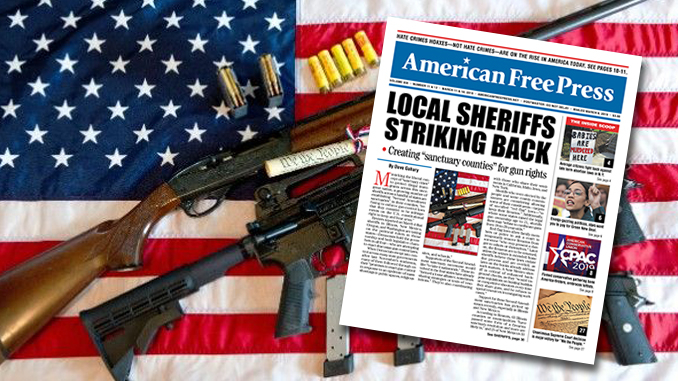
In the front-page story of American Free Press Issue 11 & 12, mailed out March 8 and available online now for digital subscribers, Dave Gahary reports on local sheriffs who are creating “sanctuary counties” for gun rights.
By Dave Gahary
Mimicking the liberal concept of “sanctuary cities” to protect illegal immigrants across this once-great nation, a growing number of sheriffs across a handful of states are establishing “Second Amendment sanctuaries” in their counties, “refusing to enforce gun-control laws that they consider to be infringements on the U.S. constitutional right to keep and bear arms.”
Reuters reported on March 4 that sheriffs in Illinois, New Mexico, Oregon, and Washington are taking on the political rulers in those states—Democrats hold the governorship and both legislative chambers in all four—who are attempting to enact draconian gun control laws.
When Democrats swept into control across many state governments after last November’s midterms, many of them followed through on their “promises to enact gun control in response to an epidemic of mass shootings in public spaces, religious sites, and schools.”
Supporters of the Second Amendment sanctuary movement would like “to take it nationwide.” Those involved in the four states have already “formed a loose alliance, sometimes sharing strategies or texts of resolutions.” They’re also coordinating with those who share their sentiments in California, Idaho, Iowa, and New York.
Sheriffs who were elected by the people and some county commissioners are considering allowing some of their constituents—targets of so-called “red-flag” laws—“to keep their firearms.” Additionally, where some states raised the legal gun ownership age to 21, sheriffs there may “refuse to confiscate guns from 18-to-20-year-olds.”
Red-flag laws allow family members or police to ask a court to temporarily remove firearms from someone “who may present a danger to others or themselves.” Later on, the firearms are to be returned, unless the seizure is extended. Some sheriffs believe these laws violate due process and are overkill, as laws on the books already address such matters. A New Mexico sheriff is critical of enhanced background checks, as they “would impose regulations on hunting buddies or competitive shooters every time they share guns, and he refuses to spend resources investigating such cases.”
Support for these Second Amendment sanctuaries has picked up steam recently, especially in Illinois and New Mexico.
According to Reuters, 63 Illinois counties or municipalities “have passed some form of a firearms sanctuary resolution and more are likely to,” and 25 of New Mexico’s 33 counties “have passed resolutions to support sheriffs who refuse to enforce any firearms laws that they consider unconstitutional.”
Last November, voters in eight of Oregon’s 36 counties approved “Second Amendment Preservation Ordinances,” allowing sheriffs to decide “which state gun laws to enforce.” Second Amendment sanctuary supporters in the Beaver State are planning to place more of these types of “measures on county ballots in 2020 that will direct their officials to resist state gun laws.”

As the “rebellion” grows, reports Reuters, a potential clash is brewing.
In Washington last November, where almost 60% of the voters approved raising the minimum age to purchase a semiautomatic rifle to 21, enhancing background checks, and increasing waiting times to buy such guns, “sheriffs in more than half of Washington’s 39 counties have pledged not to enforce it.”
The law is due to take effect this summer, and the governor is behind it. The attorney general has warned sheriffs “ ‘they could be held liable’ if they allow a dangerous person to acquire a firearm later used to do harm.”
Sheriff Bob Songer of Klickitat County wants none of that. He calls the threat a “bluff” and vows not to enforce it because he feels it’s unconstitutional.
“Unfortunately for the governor and the attorney general, they’re not my boss,” Songer told Reuters. “My only boss is the people that elected me to office.”
Dave Gahary, a former submariner in the U.S. Navy, prevailed in a suit brought by the New York Stock Exchange in an attempt to silence him. Dave is the producer of an upcoming full-length feature film about the attack on the USS Liberty. See erasingtheliberty.com for more information and to get the new book on which the movie will be based, Erasing the Liberty.
RELATED, from AFP Issue 11 & 12:
Second Amendment Critics Have Good Week in Congress
Trump vows to veto any bills that make buying guns harder.
By Mark Anderson
On Feb. 27, legislation to require background checks on all firearms purchasers, including those buying online and at gun shows, passed the House 240-190. The fervently anti-Second Amendment New York Times declared it “the first significant gun control bill to clear the chamber in a quarter of a century.”
The eight-page bill, called the Bipartisan Background Checks Act (H.R. 8), was sponsored by Rep. Mike Thompson (D-Calif.). It received an extra boost from eight Republican representatives: Brian Fitzpatrick (Penn.), Will Hurd (Texas), Pete King (N.Y.), Chris Smith (N.J.), and Fred Upton (Mich.), along with Florida Reps. Mario Diaz-Balart, Vern Buchanan, and Brian Mast.
The reported mass shooting last year at Marjory Stoneman Douglas High School in Parkland, Fla. prompted considerable student-led, media-abetted activism that galvanized Democrats to stump even harder for civilian disarmament, commonly called “gun control” by the mass media cartel and most lawmakers on Capitol Hill. Some of these young activists were in the House chamber and cheered when the vote cleared the threshold of 218 to assure passage.
However, H.R. 8 is not the only bill for incremental but stepped-up civilian disarmament to pass the House during the same week. The Enhanced Background Checks Act of 2019 (H.R. 1112) was approved 228-198 on Feb. 28. The bill’s opening line states that it would “amend chapter 44 of title 18, United States Code, to strengthen the background check procedures to be followed before a Federal firearms licensee may transfer a firearm to a person who is not such a licensee.”
In plainer language, H.R. 1112 would extend the initial review period for a background check from three to 10 days. It was brought forth by House Majority Whip James Clyburn and fellow South Carolina Rep. Joe Cunningham, with key Republican assistance from Rep. Pete King. Seven Democrats bucked party lines and voted against the bill: Anthony Brindisi (N.Y.), Torres Small (N.M.), Kendra Horn (Okla.), Collin Peterson (Minn.), Ben McAdams (Utah), Jared Golden (Maine), and Ron Kind (Wisc.). Republicans Brian Fitzpatrick and Chris Smith crossed the partisan divide and joined King in support of the bill.
Proponents of the bill say it’s needed to close the so-called “Charleston loophole.” Their argument is that the current three-day waiting period enabled the young, disturbed shooter in the 2015 Emanuel AME Church massacre in South Carolina to obtain his weapon. Clearly, events such as this are being “weaponized” to stir up emotions and induce people to accept a gravely unlawful act—disarmament of the American people—by blaming guns for crime rather than a host of other, much more plausible causes.
The timing of these bills could be tricky. Readers would do well to note that, as of this writing, approval in the Senate will be appreciably more difficult. Plus, President Donald Trump appears willing to veto both bills.
But nothing can be taken for granted. Calling Senate and House offices (especially if your Congressmember’s name is among those listed above, to either thank or chastise them accordingly no matter what the final outcome) would help ensure that Congress gets the message to leave the Second Amendment alone and help prevent Congress from mustering enough votes to override Trump’s anticipated veto. Moreover, contacting the White House would help encourage President Trump to veto the bills should they make it to his desk. Call the congressional switchboard at (202) 224-3121/ 225-3121 and the White House at (202) 456-1414. To leave comments, please call 202-456-1111.
Mark Anderson is AFP’s roving editor. He invites your thoughtful comments and story ideas at [email protected].





Your seeing this all across this great land! The separation of the wheat and chaff!